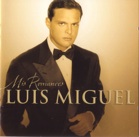Canción de noviembre
“Amor, amor, amor”
Luis Miguel
Canción de noviembre
“Amor, amor, amor”
Luis Miguel



Amor, amor, amor
nació de ti, nació de mí
de la esperanza.
Amor, amor, amor
nació de Dios, para los dos
nació del alma.
Sentir que tus besos se anidaron en mí,
igual que palomas mensajeras de luz.
Saber que mis besos se quedaron en ti,
haciendo en tus labios la señal de la cruz.
(Repetir)
Love, love, love
it was born of you, it was born of me
of the hope
Love, love, love
it was born of God, for the two (of us)
it was born of the soul
To feel that your kisses are nested inside me,
just like pigeons carriers of light
To know that my kisses dwelled inside you
marking the sign of the cross on your lips
Letra de la canción:



Gramática: 動詞 “nacer” (誕生する)の過去時制の変化
スペイン語では過去の捉え方に2種類あり、動詞の変化のさせ方もそれに合わせて2種類あります。一つは、単純に過去に何かが起きたということをいうもの、もう一つは、過去のある時点である状況が起きていたというものです。いくつか呼び方がありますが、その一つは前者を「点過去」あるいは「単純完了過去」、後者を「線過去」あるいは「不完了過去」と呼びます。この曲ではそのうち、「単純完了過去」時制が使われています。
(El amor) nació de la esperanza.
([The love] was born from the hope.)
ところで、英語で「生まれる」は「生む」(to bear) の受動態 (be born) で表現されます。日本語でも同じく「生む」の受身の形を基とする「生まれる」ですね。しかしスペイン語の動詞 “nacer” はそのまま「誕生する」という意味を持つ動詞です。
現在時制の変化は次のようになります。
yo
tú
usted
él
ella
nazco
naces
nace
nosotros(as)
vosotros(as)
ustedes
ellos
ellas
nacemos
nacéis
nacen
ただし普通、「私は生まれます」と現在時制で言うことはありませんね。「私は生まれました」というように過去時制でいうのがほとんどです。
単純過去時制の変化は次のようになります。
yo
tú
usted
él
ella
nací
naciste
nació
nosotros(as)
vosotros(as)
ustedes
ellos
ellas
nacimos
nacistéis
nacieron
例を見てみましょう。
Yo nací en Sendai, en 1993. [mil novecientos noventa y tres]
(I was born in Sendai, in 1993.)
Mi hermano nació en 1995, [mil novecientos noventa y cinco]
(My brother was born in 1995.)
ちなみに「生年月日」のことをスペイン語では “fecha de nacimiento” (「誕生の日付」)と言います。誕生日は “cumpleaños” (「歳を完遂する日」)です。